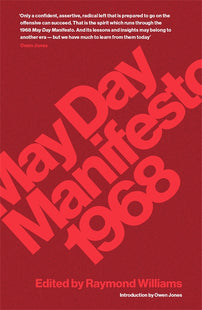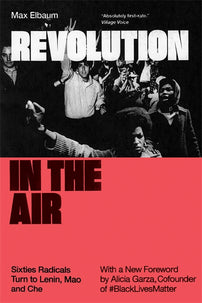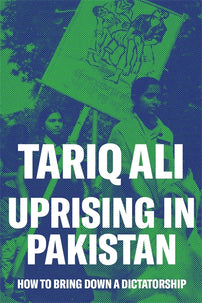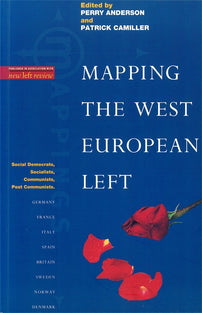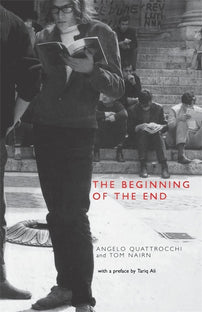Ole Grünbaum: Emigrate (February 1968)
Ole Grünbaum, a key figure of Denmark's 1960s youth movement, describes the shift from consciousness raising to practical social experimentation occurring in 1968.

An excerpt from Voices of 1968: Documents from the Global North, edited by Salar Mohandesi, Bjarke Skærlund Risager, and Laurence Cox, and published by Pluto Press. This text is translated and introduced by Bjarke Skærlund Risager and Laurence Cox.
Ole Grünbaum was among the most original and prolific writers of the Danish youth uprising. Having spent time in Amsterdam, he was a self-declared “provo” known for his “happenings." The son of a Social-Democratic Finance Minister, Grünbaum critiqued the authoritarian structures embedded in politics, the family, and his parents’ generation in general. However, unusually for the period, he also spoke against ageism. His writings combined a humanist critique with a social one; he would later describe himself as having had one foot — the biggest — in the hippie year of 1967 and one foot in 1968, a year marked by the student uprising and Vietnam War opposition. The following excerpt of the title essay from his early 1968 collection touches on the shift from consciousness raising to practical experiments. The tendency of young people “emigrating from hierarchical structures” that he identifies in his essay would be further deepened in the months and years that followed.
—
If a power structure doesn’t adapt to how society changes, it will become increasingly isolated until it’s left empty and reactive. This means that you will get a period of empty institutions — but these are only empty in terms of ideas, while they are stuffed full of people who will defend them — because this means defending their own position.
They are defending their position against those who have the right to power, and against those who have the best ideas (which here means especially the most socially relevant ones). I.e. their defence becomes an attack on initiatives and new ways of doing things. The power structure becomes a brake on further development.
[...]
The so-called youth uprisings and youth cultures are the first phases of a long-term struggle for new structures. The first phase, the consciousness of a need for a new culture, is coming to an end. The other, the time of experiments and utopias, is starting to develop. Since the structure of authority prevents the realization of these new possibilities, the talents involved will aim at other directions: they are becoming independent of the ruling power structure.
[...]
[I]f we want radical changes, we will have to begin with our own lives. When we meet obstacles, we will have to fight — but it is possible to carry out far-reaching experiments in Denmark without the authorities intervening.
It’s possible to emigrate from oppression [...] and settle in the land of freedom. Not only is it possible, it’s increasingly necessary for many people.
The authoritarian structure is a principle whose effects are felt everywhere in society. For this reason, whole new kinds of institutions have to be created. This initiative can only come from outside the existing ones. The fundamental work is being done in the new land of freedom.
[...]
It will be especially young people who move, as they have quite specific reasons to be against the family, the school and educational system, the system of work, bureaucracy, politics, the system of money, and the nation-state principle.
The family is an indispensable link in the ruling structure. The small child is shaped here in decisive ways. It is here that leisure time unfolds. And here, woman is kept outside society.
The family means isolation, lack of space and little change in your social contacts. The family means the preservation of the ruling system of gender roles and the adult-child system. The family means economic selfishness.
School is coercion, both having to go there and while you are there. It is isolated from the rest of life; it doesn’t value choosing the life you want or learning how to choose the life you want.
School takes the initiative away from children and teaches them how to conform to the opinions of others around them. Furthermore, it points backwards. Precisely because of its hierarchical structure, news ideas only penetrate slowly. This is very unfortunate as it is, after all, mostly children who are exposed to them.
Higher education is constraining. It aims at quite narrow jobs and doesn’t give the individual any possibility of creating new jobs through their education.
The universities are the most hierarchical system in our society. Here formal gerontocracy still dominates, meaning that it is a single big pyramid where new ideas struggle to enter.
Work is constraining if it is to give returns in the form of money. (Virtually) all workplaces are governed by conditions which can only be described as dictatorship. Work itself is mostly far from workers’ interests. It is often downright inhuman, and it is always impersonal.
Bureaucracy knows more about rules than about human beings. It is an impersonal hierarchy, which is inefficient because it follows general principles rather than deciding from one case to the next. One’s experience of bureaucratic power increases with age. For this reason alone, bureaucracy is reactionary.
Politics has become a professional activity for a collection of people who all have an interest in preserving society as it is. Politics has become ossified around certain economic issues, which there isn’t even any real disagreement about. Political roles are traditional and hierarchical. Politics takes away initiative and is therefore conservative. Through the politicians’ professional position, everyone on top of power in society is in the same boat. For this reason, political life is not at all suited (as intended in the constitution) as a means for the people to control the administration. And since more and more top politicians are recruited from the civil service, this will not become better with time.
Politics is exclusively an old men’s activity. No young people have any career chances.
Politics is problem-solving within an outdated national structure. Youth is internationally oriented in its whole culture. Politicians’ international visions are things like an United States of Europe, where national structures are preserved but an imperial superstructure is placed on top.
The nation-state does not match the development of industry. The international market is a reality; so are the international corporations. All young people speak English. More and more young people travel for a long time. Youth cultures are communicated internationally at the speed of light. Preserving the nation-state is important to politicians, who think nationally and hardly speak any foreign language or inform themselves about international events. For this reason, the core of many youth rebellions has been international politics: the American student movements, the West Berlin unrest after Persian Shah’s visit, the Vietnam movements in general (that one can even speak of such a thing!).
Hierarchy
The family, the school and educational system, work, bureaucracy, politics and the nation-state — all of this is built on a fundamental pattern, which can vary in many ways that refresh it (without ever renewing it). The hierarchical idea that there always have to be some people who are and have more than others works through almost every single process of change — and the fate of the so-called youth cultures stands or falls on exactly this point. Is it possible to emigrate from hierarchical culture? Or is it so deeply human that fleeing it can only lead to degeneration?
[...]
Nothing can be more wrong than believing that the various new youth movements will put up with having leaders. If too much unrest happens in Denmark, the police may very well negotiate with a lot of “provos” or “hippies” about keeping the peace, but the outcomes will not be binding in the slightest for anyone other than those who take part in the negotiations.
The question “is it possible to emigrate from the hierarchical structures?” can thus be answered by saying that by now there are a few people trying to create all kinds of things, and that at least these don’t look like the old hierarchy.
Source: Ole Grünbaum (1968): Emigrér: Lærestykker om det tiltagende kaos. Copenhagen: Hans Reitzels Forlag, pp. 18-24.
[book-strip index="1" style="display"]